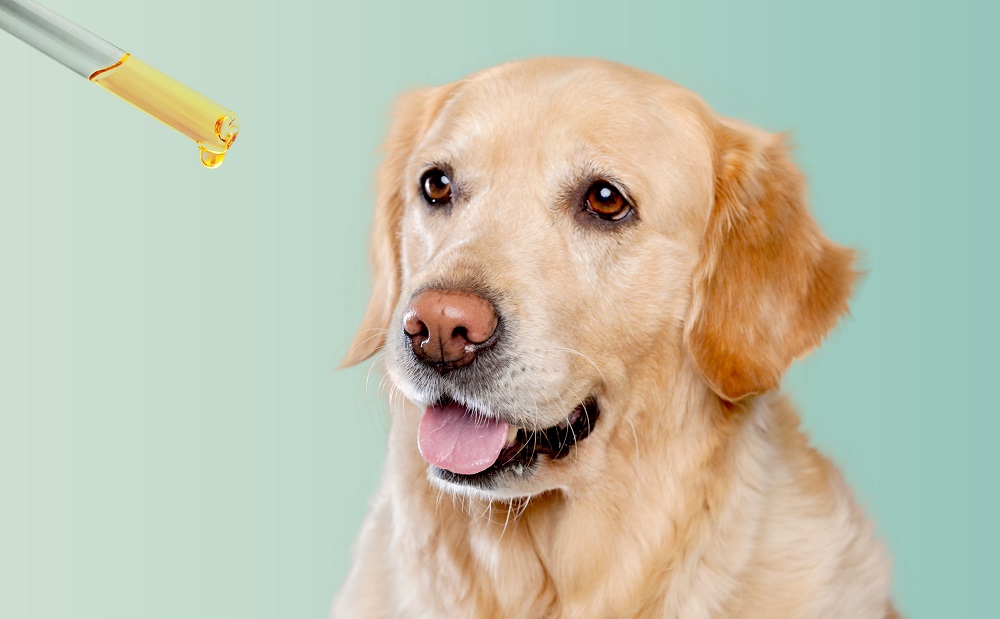CBD, or cannabidiol, is one of the compounds found in marijuana. It is the calmer, younger cousin of THC, the compound that people smoke in order to get high.
CBD is hugely popular within the wellness industry at the moment, being hailed as a miracle treatment for anxiety and a number of other mental conditions. CBD has no psychoactive properties and will not get you or your dog high.

Is CBD Safe for Dogs?
There is limited research into the safety and scope of CBD usage for humans, let alone for dogs. There are no FDA approved CBD products to give your dog, but some pet owners decide to do it anyway.
A survey carried out by VIN News Service into veterinarians and CBD for pets found that 63% of respondents were asked about it on average once per month.
Different states have different legislation on CBD use in animals, and some veterinarians put their license in jeopardy if they give out CBD advice. California has only recently lifted penalties for veterinarians that discuss CBD and marijuana with pet owners.
No states currently allow veterinarians to dispense, prescribe, or administer medical cannabis to pets. Despite this, you can find a number of CBD products aimed at a canine user. Human CBD is often safe to give to your dog as well although there is no guarantee it will be effective.
CBD Use and Dogs
Two small studies have been done into the effects of CBD on canine patients. The first was conducted in 2018 and was examining the pain killing, anti-inflammatory, and safety of CBD as a treatment for canine osteoarthritis. The average dose supplied to each dog was between 2 and 8 mg of CBD per kilogram of body weight.
In this study, 80% of the canine participants had improved mobility and pain levels. The slight issue with the reliability of this study is that it was funded by a CBD company, meaning there is an assumed level of bias in the results.
The 2019 canine CBD study was examining the impacts of CBD on epileptic dogs. The results showed that seizure medicine coupled with CBD treatment resulted in far fewer seizures than those given a placebo. More studies are needed to verify this, although the results of the study were promising.
How Can you Give your Dog CBD?
If you have ever done research into the different ways you can take CBD, you will know that there are a multitude of different options available.
The most common include oils, creams, and CBD-infused foods. The creams are applied topically to the dog’s skin, while the other forms are taken orally.
Generally speaking, oral supplementation of CBD seems to be the most effective. This is not backed up by much actual evidence, as more studies must be conducted.
How Much CBD Should you Give your Dog?
As we have mentioned, there are no specific dosage amounts stated for canines. It is always best to start low and increase the dosage, as this limits panicking your dog or overwhelming their body. We recommend starting with a dosage of 2 mg CBD per kilogram of weight.
You should pay attention to the way your dog responds and adjust the dosage based on this.
What Are the Side effects of CBD in Dogs?
There are a number of observed side effects of CBD ingestion in dogs. These are not verified by scientific evidence and are more assumptions based on the way CBD is known to affect humans.
CBD has been proven to decrease saliva production in humans. In dogs, this is likely to present as an increase in thirst levels. You may notice them running to their water bottle and lapping up water, however this should not concern you too much.
High levels of CBD ingestion have been linked to a slight drop in blood pressure. This can lead to feelings of lightheadedness, however this is only temporary. You may observe your dog swaying a little or staying still for a little while.
Some people find that CBD has an anti-anxiety effect, but this often comes hand in hand with an increased level of drowsiness. This can be felt in the same way for dogs, and you may notice your pup being tired and lethargic.
If CBD is given to your dog in high doses, it can lead to impacts on the liver. This is because the drug can impact the production of specific enzymes. This is similar to how grapefruit juice is known to interfere with liver function.
This can lead to the inhibition of drug metabolism, meaning that your dog’s medication may be rendered ineffective. It is wise to consult with your veterinarian before giving your dog CBD if they are on other medications.
A rare side effect of giving your dog CBD is itchiness. You may notice them biting, itching, or scratching after they have consumed the CBD. If this is something you observe, we strongly recommend halting giving your dog CBD.
CBD supplementation can also cause your dog to have an upset stomach. Canine stomachs are fairly sensitive and can be irritated by any change in diet.
This is another reason why we recommend starting with a low dosage of CBD. This will reduce the likelihood of your dog suffering stomach issues and becoming in pain.
If you give your dog too much CBD to begin with, their stomach may reject it. This could result in vomiting or diarrhea. A number of CBD supplements will have a bitter taste which could also induce vomiting.
As with any new inclusion to their diet, monitor your dog’s reaction closely after they have consumed it. Use their reaction to gauge your next steps.
Some dogs will exhibit tremors after they have consumed a CBD supplement. This is a known reaction in humans and canines alike, although it is rare. If you are using CBD to treat epilepsy or Parkinson’s disease, pay particular attention to this side effect.
